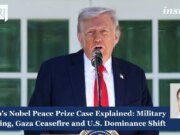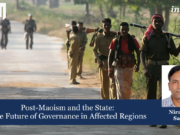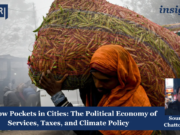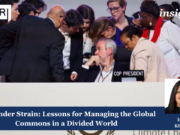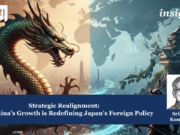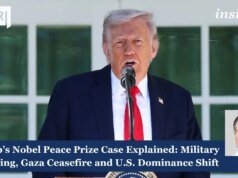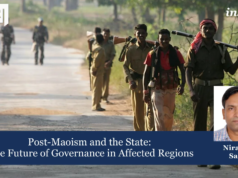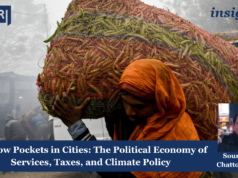Anil Trigunayat
PM Modi’s July 8-9 visit in Russia was symbolic, substantive and significant in many ways, even though it attracted undesirable attention and unsolicited comments from certain western countries and their representatives exceeding their diplomatic brief, writes Former Diplomat Amb. Anil Trigunayat.
Although in the international politics, it is often reiterated that there are no permanent enemies and friends but only interests, however, there are certain exceptions to this dictum. Perhaps India and Russia relationship to a great extent fits into that groove if one were to go by the developments over past seven decades especially since 1971 at the peak of the cold war.
Today India and Russia enjoy a special and privileged strategic partnership in the bilateral domain but regional and global developments cannot be isolated from this chemistry since each country first pursues and prefers its own national interest. The bonhomie between Prime Minister Narendra Modi and President Putin further cements the strategic partnership as it enables free and frank discussion on global and tricky issues at the highest level.
The 22nd Annual Summit (July 8-9) between the two leaders, after a hiatus of three years, attracted undesirable attention and unsolicited comments from certain western countries and their representatives exceeding their diplomatic brief. It has now been widely reported that Washington tried to dissuade PM Modi not to undertake the visit at this time since it will be bad for optics for the 75th meeting of NATO. India is neither an alliance partner nor a member of the NATO alliance that has turned from a defensive architecture to an interventionist outfit. So, the country doesn’t have to bother much about it.
India even declined the non-NATO level connect since it impinges on its strategic autonomy and we do not subscribe to the military alliance security architecture. But they are a reality and will continue to afflict the global disorder in times to come especially as a Cold War 2.0 and its intensity becomes incumbent upon the outcome of the ongoing Russia-Ukraine war and Sino-US contestations.
No wonder the leaders addressed the ongoing Eurasian and Middle East wars, continuing threat of terrorism, regional cooperation, Afghanistan, Sino-Pak axis and countering hegemony in international discourse among other issues.
As expected, post visit, indications from Chinese leadership have emerged to resolve the border fracas with India when Foreign Minister Wang Yi told National Security Advisor (NSA) Ajit Doval that Beijing is prepared to work with India to properly handle the border issues. Yi stated that he is “ready to join hands with (Doval) to implement the important consensus reached by the leaders of both countries, properly handle issues related to the situation on the ground in the border areas, and jointly safeguard peace and tranquillity in the border areas”.
Amen! Moscow prefers a rather cooler state of relations between its two close strategic partners.
PM Modi’s visit was symbolic, substantive and significant in many ways. Russia had conferred its highest civilian honour of ‘The Order of St Andrews-the Apostle’ on the Indian Prime Minister for his contribution to fostering India-Russia ties. The PM dedicated the award to the people of India and to the traditional bonds of friendship between India and Russia. He further stated that the recognition illuminates the Special and Privileged Strategic Partnership between the two countries.
A comprehensive 81 para joint statement was issued underscoring the convergences and concerns as well as some nine specific MoUs and Agreements were also signed while the critical discussions including in the areas of energy, security, defence, cyber trade, investment, health, education, culture, tourism and people-to-people exchanges, were held in one-on-one, restricted and delegation level talks .
The economic fulcrum of the relationship came into focus reflected in several agreements to further identify areas for trade, market access, payment mechanisms due to sanctions on Russia and effective use of surpluses in Rupee-Rouble trade as well as to create a balance in trade through newer opportunities and areas and sectors.
Innovative mechanisms including through strategic investments in the Indian growth story and trillions of dollars opportunity is timely for Russian companies. Hence the Investment Promotion Framework Agreement between Invest India and JSC “Management Company of Russian Direct Investment Fund” was signed to facilitate injection of capital in the strategic opportunity, thrown open by ‘Make in India ‘ across a wide gamut of sectors. Greater and practical economic cooperation in the Russian Far Eastern region, which PM Modi had last visited in 2019, will also be further activated.
Connectivity and strategic corridors have been emphasised for long. Hence India and Russia had started off about two decades ago in the context of North South Transport Corridor ( INSTC). But with the inclusion of strategic Iranian Chabahar port and long term management contract by an Indian company have added new heft as the global value and supply chains are coming under stress due to the wars and conflicts.
Likewise, eastern or Chennai-Vladivostok corridor has acquired a new significance in accordance with India’s Arctic Strategy. Therefore, a ’Program of India-Russia cooperation in trade, economic and investment spheres in the Russian Far East for the period from 2024 to 2029; as well as of cooperation principles in the Arctic zone of the Russian Federation; were signed. India has already made $1 billion Line of Credit available to Russia for facilitating projects by Indian companies in the Far East.
Defence and security cooperation has been the lynchpin of the bilateral relationship. Synergies and complementarities in these sectors are usually discussed through the Inter-Governmental Commission on Military-Technical Cooperations, and sticky issues are only flagged at the highest level. But, given the mutual trust, these also have been addressed, including delays in supplies of spares and equipment including for S-400 missile system. Thus, more co-production of spares, components and equipment in India may be expedited.
Likewise, supplies of energy and fertiliser on long term basis would be pursued through prescribed channels and B2B consultations. Civil nuclear cooperation and progress of the upcoming and future reactors and supplies of fuel and spares was yet another area of critical importance and hence discussed threadbare.
Diaspora diplomacy has become a mainstay of PM Modi’s outreach in nearly all his foreign visits. In Moscow also he spoke to them and urged them to be a bridge between the two countries. However, a sticky point was the illegal recruitment of Indians in the Russian army by some unscrupulous manpower agents. PM Modi took it up with President Putin and the issue was immediately resolved and they should return home soon. But in India it is necessary to plug the loopholes by such agencies indulging in human trafficking and malpractices to avert such incidents.
As was expected, Russia-Ukraine war was the bear in the room when the two leaders met. PM Modi had earlier, in Samarkand, told his friend Vladimir Putin that this was not an era of war.
This time round, he was visiting Moscow after conferring with other world leaders and Ukraine President Zelensky on the sidelines of Puglia G7 Summit. He had assured Zelensky after giving him a hug that India will do whatever it can to end the war and find a way for peaceful resolution. But his efforts were also dented by continued and enhanced NATO military support to the Ukrainian war effort, even though the Russian and US defence Ministers spoke day after to keep the channels open as threats of broader escalation remain clear and present danger.
PM Modi expressed his indignation and pain at the heart-wrenching news of so many children killed in Ukraine, day before, in a missile strike. He once again urged that peace cannot be achieved on the battlefield and efforts cannot succeed amidst bombs and bullets, and dialogue diplomacy must prevail. Modi, however, appeared confident and hopeful of some positive outcome after his deliberations with President Putin. But it takes two to tango.
India and Russia have a unique partnership but it needs to be nurtured. It could not be taken for granted as India finds many suitors and some of them even jealous and find this steady and constant relationship to be a stumbling block rather than considering it as a pillar of peace and stability in a multipolar world.
Irrespective of the noise, the relationship is expected to continue on its robust strategic track. Since Russia is the chair of BRICS this year, PM Modi might visit Kazan for the summit later in the year, even as he has invited President Putin to visit India in 2025.
Anil Trigunayat, is a former Indian Ambassador to Jordan, Libya and Malta, and currently heads the West Asia Experts Group at Vivekananda International Foundation.
The article was first published in CNBCTV18 as Modi-Putin meet — why India should ignore the West’s wrath on July 15, 2024
Disclaimer: All views expressed in the article belong solely to the author and not necessarily to the organisation.
Read more at IMPRI:
Seizing the Moment: India’s Tourism Strategy Amidst Global Changes
French Elections 2024: Macron’s Triumph Over Far-Right Nationalism
Acknowledgment: This article was posted by Bhaktiba Jadeja, a research intern at IMPRI.


